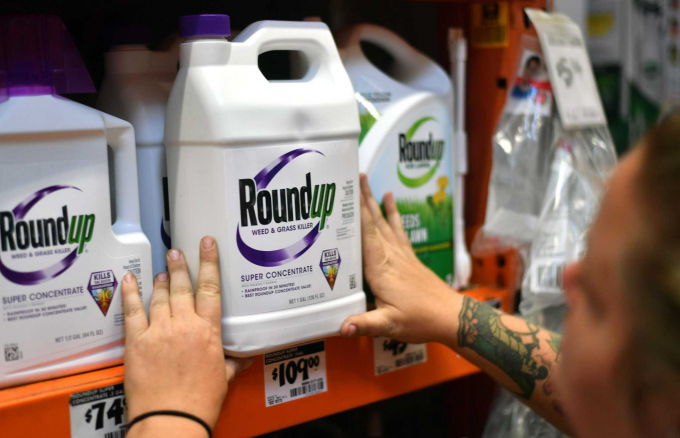May 24, 2025 | 16:28 GMT +7
May 24, 2025 | 16:28 GMT +7
Hotline: 0913.378.918
May 24, 2025 | 16:28 GMT +7
Hotline: 0913.378.918
multiple research studies conducted over many years show an “almost certain” connection between Monsanto glyphosate-based herbicides and cancer.

An employee adjusts Roundup products on a shelf at a store in San Rafael, California, on July, 9, 2018. A lawyer for a California groundskeeper dying of cancer took aim at Monsanto on July 9, 2018 as a jury began hearing the lawsuit accusing the chemical giant of ignoring health risks of its top-selling weed killer Roundup. Photo: AFP
Christopher Portier, who is testifying as expert witness on behalf of plaintiff Donnetta Stephens in her lawsuit against Monsanto, appeared in person in the courtroom earlier in the week but answered questions from Monsanto’s lawyer via Zoom on Thursday due to travel commitments.
Portier was also an expert witness for the plaintiffs in the three prior Roundup trials. In each of the prior trials, juries agreed that Monsanto’s glyphosate herbicides caused the plaintiffs to develop a type of cancer called non-Hodgkin lymphoma (NHL).
In hours of testimony that stretched over several days, Portier told jury members about studies done on human cell lines as well as studies conducted on laboratory animals and studies of exposure and disease incidence in humans. The evidence of a cancer connection was strongest in the animal studies, and was supported by the additional research, he said.
“I am certain that glyphosate can cause tumors in animals,” including malignant lymphomas in mice, Portier testified. When asked his opinion on the question of whether or not real-world Roundup exposure can cause NHL in people, Portier said: “I believe that it does, I think the strength of that belief is almost certain but not quite.”
Regular Roundup user
Lawyers for Stephens say that she was a regular user of Roundup herbicide for more than 30 years and it was that extended exposure to the glyphosate-based products made popular by Monsanto that caused her NHL.
Stephens was diagnosed in 2017 and has suffered from numerous health complications amid multiple rounds of chemotherapy since then. Because of her poor health, a judge in December granted Stephens a trial “preference,” meaning her case was expedited, after her lawyers informed the court that Stephens is “in a perpetual state of pain,” and losing cognition and memory.
She is one of tens of thousands of plaintiffs who filed U.S. lawsuits against Monsanto after the World Health Organization’s cancer experts classified glyphosate – the active ingredient in Monsanto’s herbicides – as a probable human carcinogen with an association to non-Hodgkin lymphoma.
Judge Gilbert Ochoa of the Superior Court of San Bernardino County in California is overseeing the proceedings.
Judge reverses order on preemption
In a move that could prove important to the outcome of the case, Judge Ochoa this week reversed his own pretrial ruling related to Monsanto’s argument that federal law preempts the “failure to warn” claims that Stephens’ lawyers want to present to the jury.
The judge had agreed with Monsanto that federal law regarding pesticide regulation and labeling preempts failure-to-warn claims under state law, and he had limited the ability of Stephens’ lawyers to pursue such claims.
But the judge changed his position after the 1st Appellate District in the Court of Appeal for California issued a ruling on Monday denying Monsanto’s preemption argument in a separate case.
The appeals court issued scathing criticism of Monsanto, writing that “substantial evidence supports the jury’s verdicts” and that “Monsanto’s conduct evidenced reckless disregard of the health and safety of the multitude of unsuspecting consumers it kept in the dark.”
The day after the appeals court ruling, Monsanto noted in a brief filed with Judge Ochoa that it recognized the appellate court decision was “binding” on the San Bernardino court, but said the appeals court “committed legal error.”
Monsanto owner Bayer AG has said publicly it sees its best hope of escaping ongoing litigation in persuading the U.S. Supreme Court to review and overturn one of the trial losses on the preemption issue.
Another trial sought in St. Louis
After losing the first three trials, Bayer, which bought Monsanto in 2018, has settled other cases that had been scheduled to go to trial. And in 2020, the company said it would pay roughly $11 billion to settle about 100,000 existing Roundup cancer claims. Late last month, Bayer said it would set aside another $4.5 billion toward Roundup litigation liability.
Bayer also announced it would stop selling Roundup, and other herbicides made with the active ingredient glyphosate, to U.S. consumers by 2023. But the company continues to sell the products for use by farmers and commercial applicators.
But several law firms continue to seek to bring cases to trial. In late July, lawyers for a group of 13 plaintiffs filed a motion with the St. Louis County Circuit Court seeking a trial date. That case is 19SL-CC04115, Kyle Chaplick et al v Monsanto.
(USRTK)

(VAN) Alt Carbon has raised $12 million in a seed round as it plans to scale its carbon dioxide removal work in the South Asian nation.

(VAN) Attempts to bring down the price of the Japanese staple have had little effect amid a cost-of-living crisis.

(VAN) Fourth most important food crop in peril as Latin America and Caribbean suffer from slow-onset climate disaster.

(VAN) Shifting market dynamics and the noise around new legislation has propelled Trouw Nutrition’s research around early life nutrition in poultry. Today, it continues to be a key area of research.

(VAN) India is concerned about its food security and the livelihoods of its farmers if more US food imports are allowed.

(VAN) FAO's Director-General emphasises the need to work together to transform agrifood systems.

(VAN) Europe is facing its worst outbreak of foot-and-mouth since the start of the century.